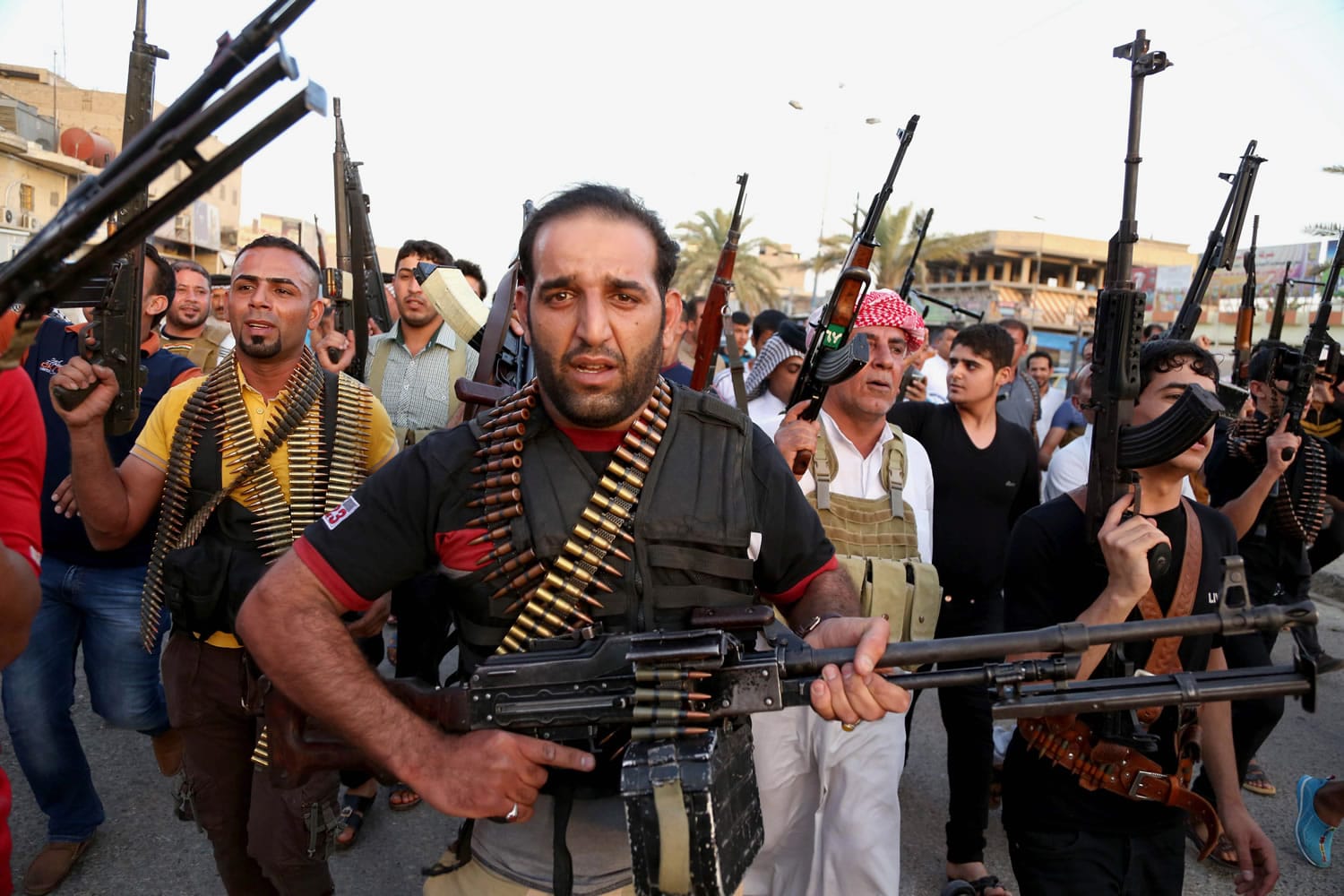BAGHDAD — Iraq’s Shiite clerical leadership called Friday on all Iraqis to defend their country from Sunni militants who have seized large swaths of territory, and a U.N. official expressed “extreme alarm” at reprisal killings in the offensive, citing reports of hundreds of dead and wounded.
U.S. President Barack Obama said he is weighing options for countering the insurgency, but warned Iraqi leaders that he would not take military action unless they moved to address the country’s political divisions.
Fighters from the al-Qaida-inspired Islamic State of Iraq and the Levant made fresh gains, driving government forces at least temporarily from two towns in an ethnically mixed province northeast of Baghdad. The assault threatens to embroil Iraq more deeply in a wider regional conflict feeding off the chaos caused by the civil war in neighboring Syria.
The fast-moving rebellion, which also draws support from former Saddam Hussein-era figures and other disaffected Sunnis, has emerged as the biggest threat to Iraq’s stability since the U.S. withdrawal in 2011. It has pushed the nation closer to a precipice that could partition it into Sunni, Shiite and Kurdish zones.
Prime Minister Nouri al-Maliki, whose Shiite-led government is struggling to form a coherent response to the crisis, traveled to the city of Samarra to meet with military commanders late Friday, according to state TV.
Militants earlier in the week overran military bases and several communities including the second-largest city of Mosul and Saddam’s hometown of Tikrit. Samarra, the site of a prominent Shiite shrine 60 miles north of Baghdad, sits between Tikrit and the capital.
A representative for Grand Ayatollah Ali al-Sistani, the most revered Shiite spiritual leader in Iraq, told worshippers at Friday prayers that it was their civic duty to confront the threat.
“Citizens who can carry weapons and fight the terrorists in defense of their country, its people and its holy sites should volunteer and join the security forces,” said Sheik Abdul-Mahdi al-Karbalaie, whose comments are thought to reflect al-Sistani’s thinking.
He warned that Iraq faced “great danger,” and that fighting the militants “is everybody’s responsibility, and is not limited to one specific sect or group.”
In Geneva, U.N. human rights chief Navi Pillay warned of “murder of all kinds” and other war crimes in Iraq, and said the number killed in recent days may run into the hundreds, while the wounded could approach 1,000.
Pillay said her office has received reports that militants rounded up and killed Iraqi army soldiers as well as 17 civilians in a single street in Mosul.
Her office heard of “summary executions and extrajudicial killings” as ISIL militants overran Iraqi cities and towns this week, the statement said.
Obama did not specify what options he was considering, but he ruled out sending American troops back into combat in Iraq.
“We’re not going to allow ourselves to be dragged back into a situation in which, while we’re there we’re keeping a lid on things, and after enormous sacrifices by us, after we’re not there, people start acting in ways that are not conducive to the long-term stability and prosperity of the country,” he said.
Administration officials said Obama is weighing airstrikes using drones or manned aircraft. Other short-term options include an increase in surveillance and intelligence-gathering. The U.S. also is likely to increase aid to Iraq, including funding, training and both lethal and nonlethal equipment.
Al-Maliki and other Iraqi leaders have pleaded with Washington for more than a year for additional help to combat the growing insurgency.
Neighboring Shiite powerhouse Iran signaled its willingness to confront the growing threat from the militant blitz.
Former members of Tehran’s powerful Revolutionary Guard have announced their readiness to fight in Iraq against the Islamic State, the official IRNA news agency reported. Iranian state TV quoted President Hassan Rouhani as saying his country will do all it can to battle terrorism next door.
“The Islamic Republic of Iran will apply all its efforts on the international and regional levels to confront terrorism,” the report said Rouhani told al-Maliki by phone.
Iranian officials denied their forces were actively operating in Iraq, however.
ISIL has vowed to march on Baghdad, but the capital would be a difficult target with its large Shiite population. So far, it has stuck to the Sunni heartland and former Sunni insurgent strongholds where people are alienated by al-Maliki’s government over allegations of discrimination and mistreatment.
Iraq’s former Sunni vice president, Tariq al-Hashemi, told the AP in Istanbul that while ISIL one player in the uprising, it is not the driving force. “They are not involved in the decision-making,” he said, adding that the Sunni tribes in Mosul and Anbar are “behind this Iraqi spring.”
Shiite cleric Muqtada al-Sadr and the Asaib Ahl al-Haq Shiite militia have vowed to defend Shiite holy sites, raising the specter of street clashes and sectarian killings.
Still, authorities have tightened security around the capital and residents stocked up on supplies.



